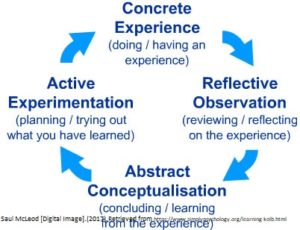Evidence based practice

Evidence based practice is the application of relevant literature into the practical work that ensures the safe and high quality practice. EBP relies on evidences that guides and helps in decision making for the nurses and other medical health professionals. This essay is on the use of EBP in medication administration.
Kolb’s reflective cycle

Concrete experience
During my second year clinical placement, my preceptor, SN X instructed me to administer the medication through Intra Venous route. This was my first time administering IV medication after my training period. I was hesitant at first because I was unsure of policies and protocols on intravenous medication and I have yet to attend the training course for this module. This was an unsafe practice and patient safety was my main priority. I was unsure of the processes involve in administering IV medication through proper method. I told my preceptor that I was not proficient in this practice and this may potentially lead to undesired patient outcomes. RN suggested me that I use evidence-based practice to learn about different strategies that can be used to administer medication via IV route.
Reflective observation
I researched on various research papers on the proper methods of IV drug administration and also studied that policies and procedures on IV administration. I learnt learnt appropriate strategies for medication administration. I learnt about the safe preparation and administration of EV medicine practice and relied on evidence-based practice for safe medication practice. The use of EBP helped me in learning about the preparation that is using dilution strategies and IV administration of medication. I realized the importance of use of EBP into the practical work and the way it helped me in administering the medication through IV route. This practice ensured patient safety and I referred to currently available literature and guidelines for safe medication practices.
Abstract conceptualization
Evidence based practice is described as the best available practice that nurses should abide by as it is proven to be the safest and proper strategy to be implemented in clinical area. The process of referring to literature helps keep nurses up- to- date with new practices that are efficient and safe for patients (Dotson et al., 2915). The use of EBP helps in enhancing expertise of medical profession and assist in delivering safe care. Safe patient care is the main priority for nurses and the use of EBP will facilitate the delivery of safe practice and desired patient outcomes (Dang & Dearholt, 2018).
Active experimentation
The use of EBP was highly beneficial and has helped me in delivering safe medication practice. In the future, I will make sure that I use EBP as reference to deliver safe and effective care to the patients as it helps increase the chances of desired patient outcomes. I also learnt the proper techniques to ensure the integrity of the administration of IV medications is intact to prevent infection to the patient. I will always make sure to use evidence based practice while working with patients and in my future nursing practices that I am not proficient in.
Conclusion
To conclude, the use of EBP enhances the performance of nurses and helps them in delivering safe and appropriate care to the patients. The use of EBP in this case has helped me understand better the sterile techniques that can be used in administrating IV medication. Furthermore, it promotes positive patient outcomes and safe delivery practices.
References
Dang, D., & Dearholt, S. (2018). Supplemental materials for Johns Hopkins Nursing Evidence-Based Practice: Model and Guidelines. Sigma Theta Tau International.
Dotson, B. J., Lewis, L. S., Aucoin, J. W., Murray, S., Chapin, D., & Walters, P. (2015). Teaching evidence-based practice (EBP) across a four-semester nursing curriculum. Teaching and Learning in Nursing, 10(4), 176-180.
